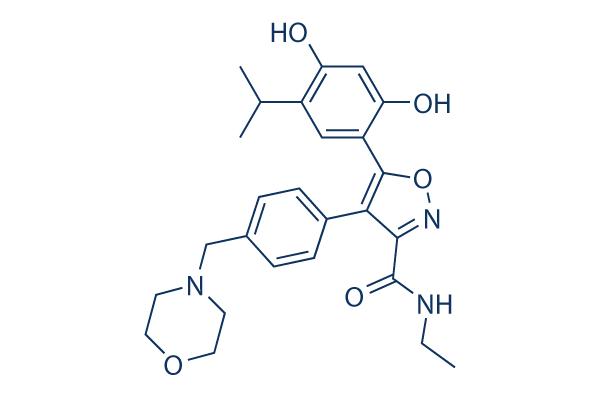Products
Luminespib 747412-49-3
| 1.Inquiries will be replied within 24 hours |
| 2.We could supply various packages as you required |
| 3.To protect the profit of our agents, price will not show on website, please send inquiries to get the price. |
| 4.Fast delivery, goods arrive your office within 3 to 5 days |
| 5.Please click "Inquiry" or "Email" below to get the price |
 |
|
|
||||||
|
C26H31N3O5 |
|
|||||
|
465.54 |
|
in stock | ||||
|
747412-49-3 |
|
98%+ |
Introduction
Luminespib (AUY-922, NVP-AUY922) is a highly potent HSP90 inhibitor for HSP90α/β with IC50 of 13 nM /21 nM in cell-free assays, weaker potency against the HSP90 family members GRP94 and TRAP-1, exhibits the tightest binding of any small-molecule HSP90 ligand. Phase 2.
NVP-AUY922 inhibits proliferation of various human cancer cell lines in vitro, with an average GI50 of 9 nM. [1] The IC50 values of NVP-AUY922 fall in the range of 2 to 40 nM in these gastric cancer cell lines. IC50 value for the BEAS-2B cells is 28.49 nM. Treatment with NVP-AUY922 does not influence the expression of HSP90, but expression of HSP70 gets elevated by NVP-AUY922 treatment. NVP-AUY922 increases the binding of HSP70 to HSP90. NVP-AUY922 causes p23 dissociation from the HSP90 complex and can then recruit HSP70 to the HSP90 complex. [1] After the treatment with NVP-AUY922, expression of receptor tyrosine kinases including VEGFR1, 2, 3 and PDGFRɑ is decreased. A decrease is also noticed in the expression of Akt and phospho-Akt. Meanwhile, treatment with NVP-AUY922 causes decreased expression of HER-2 in NCI-N87 cells. NVP-AUY922 treatment results in binding of HSP90 to client proteins and setting them up as targets for degradation by the proteasome. NVP-AUY922 can influence cell growth by affecting multiple signaling pathways. In addition, treatment with the proteasome inhibitor, MG132, restores expression of thymidylate synthase, which is decreased by NVP-AUY922. NVP-AUY922 increases the expression of cleaved caspase-3 leading to apoptosis in HSC-2 cells.[1]
Products for scientific research use only.
NVP-AUY922 inhibits proliferation of various human cancer cell lines in vitro, with an average GI50 of 9 nM. [1] The IC50 values of NVP-AUY922 fall in the range of 2 to 40 nM in these gastric cancer cell lines. IC50 value for the BEAS-2B cells is 28.49 nM. Treatment with NVP-AUY922 does not influence the expression of HSP90, but expression of HSP70 gets elevated by NVP-AUY922 treatment. NVP-AUY922 increases the binding of HSP70 to HSP90. NVP-AUY922 causes p23 dissociation from the HSP90 complex and can then recruit HSP70 to the HSP90 complex. [1] After the treatment with NVP-AUY922, expression of receptor tyrosine kinases including VEGFR1, 2, 3 and PDGFRɑ is decreased. A decrease is also noticed in the expression of Akt and phospho-Akt. Meanwhile, treatment with NVP-AUY922 causes decreased expression of HER-2 in NCI-N87 cells. NVP-AUY922 treatment results in binding of HSP90 to client proteins and setting them up as targets for degradation by the proteasome. NVP-AUY922 can influence cell growth by affecting multiple signaling pathways. In addition, treatment with the proteasome inhibitor, MG132, restores expression of thymidylate synthase, which is decreased by NVP-AUY922. NVP-AUY922 increases the expression of cleaved caspase-3 leading to apoptosis in HSC-2 cells.[1]
Products for scientific research use only.






